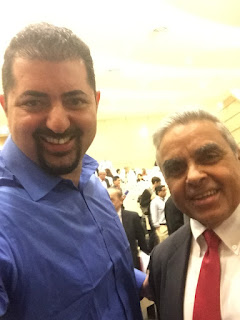I just discovered this old post. I was going to publish it in December 2011, but I put it aside and forgot about it.
________
I've been feeling a bit strange lately and needed to get out to a different locale. I used a free Southwest ticket and recently spent a few days in New Orleans. It was fun, but the trip didn't do much to resolve my internal miasma. I don't know if this is a midlife crisis, especially because I'm only in my early thirties, but it feels like I'm moving steadily forward into nowhere.
I had a list of goals to accomplish before I turned 30 years old, and I completed most of them. I thought I was aiming high--I included unique items like shaking Warren Buffett's hand, which I did at the 2007 Berkshire Hathaway meeting. I completed other goals earlier than I thought I would, like paying off my law school loans.
I haven't been able to come up with another list of goals. I recall reading about Ted Turner's dad telling his son to aim high and to set goals he'd never be able to achieve. That way, he'd always have something to keep him going.
I haven't really accomplished much anyhow, which makes my inability to write another "to-do" list puzzling. The older I get, though, the more I realize that people who get things done don't usually write about themselves a whole lot. They just focus on the task at hand, get it done, and move forward to the next task. They focus more on their family, their friends, their colleagues, and their local surroundings than abstract issues like the world, politics, or the stock market.
With my degrees in Philosophy, English, and law, I've probably spent most of my life dealing with abstract issues. While I cherish my general knowledge and experiences, it seems time to focus more on the here-and-now, which may help me re-gain the energy and optimism I had when I had nothing.
From a financial standpoint, I am currently mostly in cash/money market funds. I've been luckier than most--since December 2007, I've lost around 14% in my retirement accounts and made money in my regular accounts. In my retirement accounts, I will be looking to buy more TIPs (either TIP or VIPSX) and/or low-cost corporate bond funds (e.g., VWEHX, VCVSX). [Update: my positions may change at any time. Nothing here constitutes investment advice.] I will still attend shareholder meetings, and I may write about them on this blog; however, I foresee writing more book reviews and fewer posts (maybe once every month).
I continue to believe the most dangerous modern development has been the attenuation of community, i.e. the unnatural separation of things that used to go together, and the knowledge we gain and take for granted when we live with engaged people in an honest community. These days, neighbors don't know each other well; bankers don't directly own their mortgages; elected representatives listen more to lobbyists than ordinary people; schools don't teach children basic principles about government and economics, because no one can agree on the fundamental things anymore (not even whether torture is acceptable); people worry more about protecting their slice of the pie than increasing its size and longevity; families in larger cities need dual incomes so they lack the time to keep local governments honest; men, generally the more unpredictable gender, have fewer ways of proving their manhood locally and seem to unconsciously seek conflict to prove their importance; and war has become all too easy and no less horrific. In short, things seem to be falling apart; the center cannot be found, much less maintained.
The second most dangerous modern change is the failure of serious journalism. Read New York Times v. Sullivan to see the role America's founders expected of newspapers and media. Needless to say, it's a serious, substantial role--not one that bombards the public with Britney Spears, Lindsey Lohan, and Chris Brown. Imagine: without the Washington Post's (WPO) intrepid reporting, would we have known about Watergate? Fast-forward to recent times, and the New York Times (NYT) has caved into the government's "request" to delay publishing warrantless wiretapping reports.
How did we go from newspapers keeping the government honest to newspapers assisting the government in withholding information? Is it any wonder newspaper companies are going bankrupt? But without national newspapers to expose government corruption, who will fill the investigative void? TMZ? The Drudge Report? The National Enquirer? Will major newspapers revert to non-public forms so they can focus on investigative reporting? Or are financial interests so entrenched that it is too late to return to a more appropriate business model? The current situation--government and deficits becoming larger, while few credible entities have the resources to expose corruption and incompetence--is untenable.
I'm not one to leave on a dour note, so I will end with the following Theodore Roethke poem, which, to me, explains best where I'm at:
I wake to sleep, and take my waking slow.
I feel my fate in what I cannot fear.
I learn by going where I have to go.
I wake to sleep, and take my waking slow.
I learn by going where I have to go.
Thank you for reading. Feel free to come back once in a while.
________
I've been feeling a bit strange lately and needed to get out to a different locale. I used a free Southwest ticket and recently spent a few days in New Orleans. It was fun, but the trip didn't do much to resolve my internal miasma. I don't know if this is a midlife crisis, especially because I'm only in my early thirties, but it feels like I'm moving steadily forward into nowhere.
I had a list of goals to accomplish before I turned 30 years old, and I completed most of them. I thought I was aiming high--I included unique items like shaking Warren Buffett's hand, which I did at the 2007 Berkshire Hathaway meeting. I completed other goals earlier than I thought I would, like paying off my law school loans.
I haven't been able to come up with another list of goals. I recall reading about Ted Turner's dad telling his son to aim high and to set goals he'd never be able to achieve. That way, he'd always have something to keep him going.
I haven't really accomplished much anyhow, which makes my inability to write another "to-do" list puzzling. The older I get, though, the more I realize that people who get things done don't usually write about themselves a whole lot. They just focus on the task at hand, get it done, and move forward to the next task. They focus more on their family, their friends, their colleagues, and their local surroundings than abstract issues like the world, politics, or the stock market.
With my degrees in Philosophy, English, and law, I've probably spent most of my life dealing with abstract issues. While I cherish my general knowledge and experiences, it seems time to focus more on the here-and-now, which may help me re-gain the energy and optimism I had when I had nothing.
From a financial standpoint, I am currently mostly in cash/money market funds. I've been luckier than most--since December 2007, I've lost around 14% in my retirement accounts and made money in my regular accounts. In my retirement accounts, I will be looking to buy more TIPs (either TIP or VIPSX) and/or low-cost corporate bond funds (e.g., VWEHX, VCVSX). [Update: my positions may change at any time. Nothing here constitutes investment advice.] I will still attend shareholder meetings, and I may write about them on this blog; however, I foresee writing more book reviews and fewer posts (maybe once every month).
I continue to believe the most dangerous modern development has been the attenuation of community, i.e. the unnatural separation of things that used to go together, and the knowledge we gain and take for granted when we live with engaged people in an honest community. These days, neighbors don't know each other well; bankers don't directly own their mortgages; elected representatives listen more to lobbyists than ordinary people; schools don't teach children basic principles about government and economics, because no one can agree on the fundamental things anymore (not even whether torture is acceptable); people worry more about protecting their slice of the pie than increasing its size and longevity; families in larger cities need dual incomes so they lack the time to keep local governments honest; men, generally the more unpredictable gender, have fewer ways of proving their manhood locally and seem to unconsciously seek conflict to prove their importance; and war has become all too easy and no less horrific. In short, things seem to be falling apart; the center cannot be found, much less maintained.
The second most dangerous modern change is the failure of serious journalism. Read New York Times v. Sullivan to see the role America's founders expected of newspapers and media. Needless to say, it's a serious, substantial role--not one that bombards the public with Britney Spears, Lindsey Lohan, and Chris Brown. Imagine: without the Washington Post's (WPO) intrepid reporting, would we have known about Watergate? Fast-forward to recent times, and the New York Times (NYT) has caved into the government's "request" to delay publishing warrantless wiretapping reports.
How did we go from newspapers keeping the government honest to newspapers assisting the government in withholding information? Is it any wonder newspaper companies are going bankrupt? But without national newspapers to expose government corruption, who will fill the investigative void? TMZ? The Drudge Report? The National Enquirer? Will major newspapers revert to non-public forms so they can focus on investigative reporting? Or are financial interests so entrenched that it is too late to return to a more appropriate business model? The current situation--government and deficits becoming larger, while few credible entities have the resources to expose corruption and incompetence--is untenable.
I'm not one to leave on a dour note, so I will end with the following Theodore Roethke poem, which, to me, explains best where I'm at:
The Waking
I feel my fate in what I cannot fear.
I learn by going where I have to go.
We think by feeling. What is there to know?
I hear my being dance from ear to ear.
I wake to sleep, and take my waking slow.
I hear my being dance from ear to ear.
I wake to sleep, and take my waking slow.
Of those so close beside me, which are you?
God bless the Ground! I shall walk softly there,
And learn by going where I have to go...
God bless the Ground! I shall walk softly there,
And learn by going where I have to go...
I learn by going where I have to go.
Thank you for reading. Feel free to come back once in a while.






























